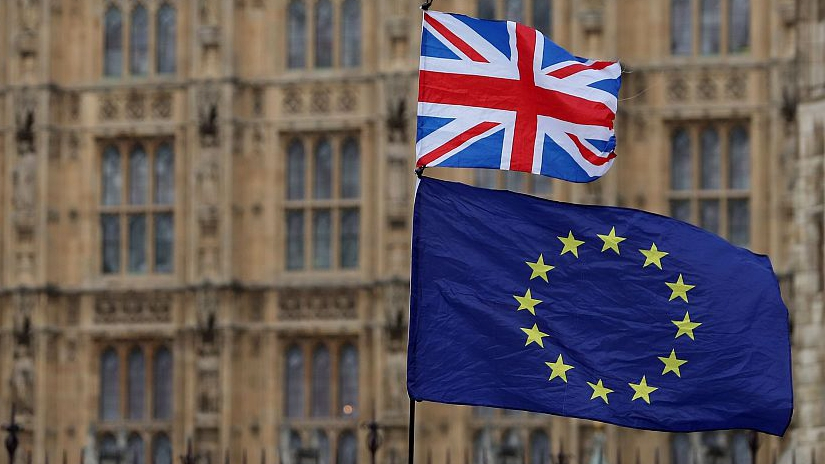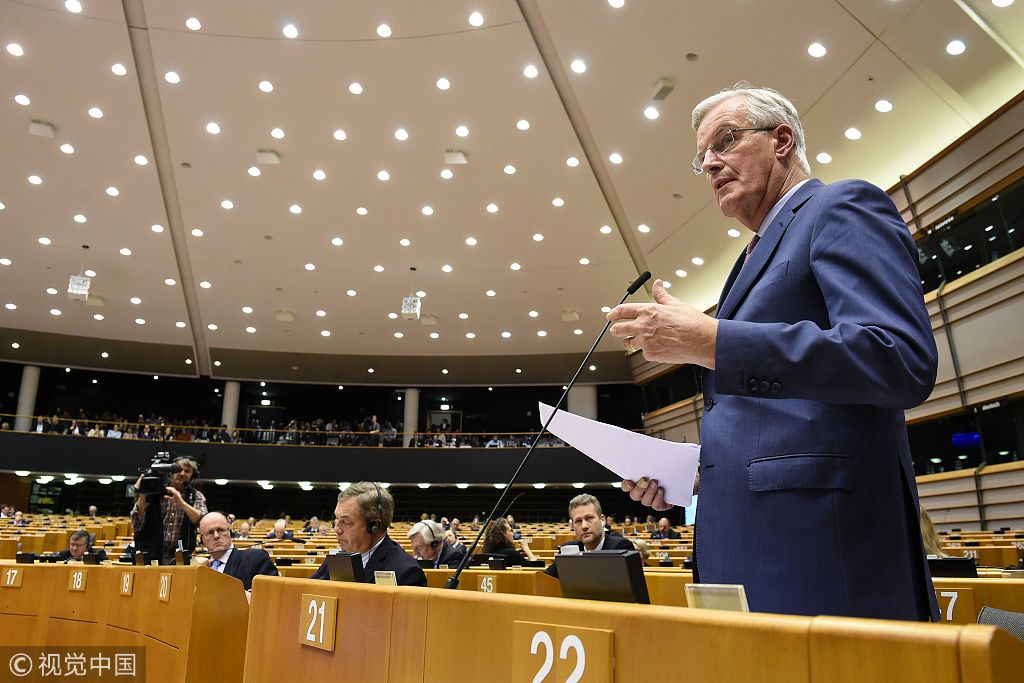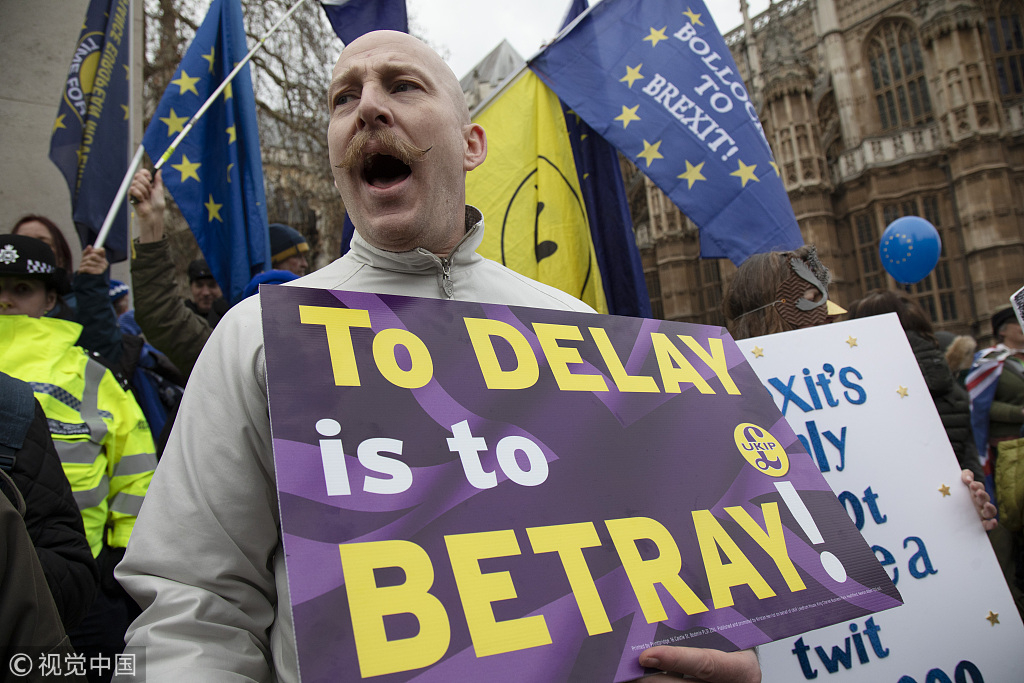
Opinion
20:17, 01-Feb-2019
Why I have changed my mind on Brexit
Updated
12:49, 02-Feb-2019
Nicolas Groffman

Editor’s note: Nicolas Groffman is a commercial lawyer who spent 20 years in China and now lives in Maidenhead, UK. The article reflects the author’s view, and not necessarily those of CGTN.
The UK is due to leave the European Union on March 29. In 2016, when we voted in the referendum, I had hoped we would stay in the EU. The last two years have made me change my mind. I now believe Britain can achieve more outside of Europe.
I have watched while the institutions of the EU banded together to prove their point: that Britain was wrong and must be punished. This anti-Britishness has existed for decades. In 1963, de Gaulle stated that Britain was “socially, economically, and politically unsuitable to be a member of the European Community.” These attitudes have persisted. In 2012, a senior Baltic official was quoted as saying "Britain is a nuisance; it imposes an additional burden on us of having to go around it, complicating negotiations."
This continued into 2018 – European Council's President Donald Tusk's tweets of cake; President of the European Commission Jean Claude Juncker doing a May-style dance. Juncker even leaked the details of a private dinner with May in 2017, imagining this to be a clever trick, when in fact it destroyed any trust. Tusk himself frequently referred to the UK's referendum as “stupid.”
Michel Barnier, supposedly an expert negotiator, showed no understanding of the UK's parliamentary politics, expecting the British government to dictate terms to Parliament which would then force them on the British people, and frequently commented that “the clock is ticking,” hoping to scare the British.

European chief Brexit negotiator, Michel Barnier speaks during a session of the parliament at EU headquarters in Brussels, on January 30, 2019. /VCG Photo
European chief Brexit negotiator, Michel Barnier speaks during a session of the parliament at EU headquarters in Brussels, on January 30, 2019. /VCG Photo
Yet the EU's negotiations have been more chaotic than Britain's. First, it refused to talk to Britain until Article 50 was triggered, effectively wasting 10 months. And then, it asked for a payout of 60 billion euros but after six months it was changed to 100 billion euros, making it look absurd.
Despite their mistakes, the EU negotiators' statements are still repeated approvingly by the other EU leaders, who are required to show a united front (unlike the British tradition of transparent debate). The result has been that EU negotiators exist in a self-congratulatory echo chamber, reducing the chance of a deal.
And yet, strange as it may seem, the UK is in a strong position. Yes, it is outnumbered 27 to 1, but the EU's position is strategically more precarious: it accounts for only 14 percent of the world's GDP, whereas when the UK joined in 1973 it was 30 percent. It is declining in importance.
The UK's unique position in the world, in particular, its relationships with the Commonwealth and the Anglosphere, gives it advantages unavailable to other EU members. The British have achieved incredible successes over their history and show no signs of slowing.

"Leave means leave" pro-Brexit anti-Europe demonstrator protests with a "to delay is to betray" placard in Westminster opposite Parliament on the day MPs voted on EU withdrawal deal amendments, January 29, 2019, in London. /VCG Photo
"Leave means leave" pro-Brexit anti-Europe demonstrator protests with a "to delay is to betray" placard in Westminster opposite Parliament on the day MPs voted on EU withdrawal deal amendments, January 29, 2019, in London. /VCG Photo
Britain is the country of Newton, Shakespeare, Darwin, Freddy Mercury, the Beatles, JK Rowling, Alan Turing, and Steven Hawking. The British invented the steam engine, vaccination, the computer, the bicycle, the telephone, the jet engine, IVF, Viagra, the Christmas card, the lawnmower, the rubber band, the toothbrush, the fridge, sunglasses, marmalade, the can opener, the tank, the torpedo. The British were the first to split the atom and to clone an animal. They discovered the planet Uranus, and DNA.
It has modernized more effectively than other European nations. Immigration from India, China, Africa, the West Indies and the New World has made the nation even more inventive, creative and diverse than ever before. It will soon terminate the restrictive Freedom of Movement policy, which unfairly favors EU citizens above people from the rest of the world.
Most economists take a darker view of Britain's chances. JP Morgan, Goldman Sachs, HM Treasury and others predicted a fall in economic output in 2016, then in 2017, then in 2018. They were wrong each time.
According to the Office of National Statistics, foreign direct investment into the UK increased, as did imports and exports. The only measure that showed a decline was domestic investment. During the same period, British businesses have been energetically recalibrating, learning about and trading with companies outside the EU. British achievement continues apace: the UK has won eight Nobel prizes since 2016, and its cultural exports continue to dominate.
British relations with the U.S., India, China, Brazil, Japan and the rest of the world are now more important than relations with the EU. It is good news that on January 29, Theresa May's government, at last, won a victory in Parliament, by 317 votes to 301. This ought to persuade the EU to make concessions on the backstop that will enable them to get a deal. But if there is no deal with the EU, Britain will thrive without it.
(If you want to contribute and have specific expertise, please contact us at opinions@cgtn.com.)

SITEMAP
Copyright © 2018 CGTN. Beijing ICP prepared NO.16065310-3
Copyright © 2018 CGTN. Beijing ICP prepared NO.16065310-3